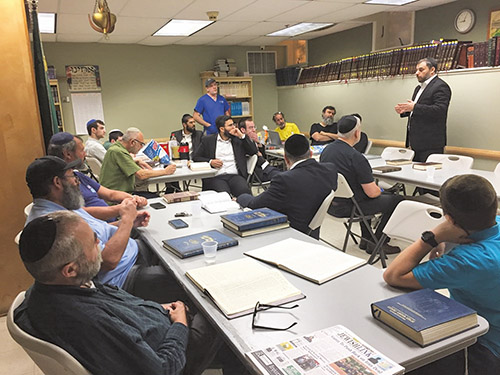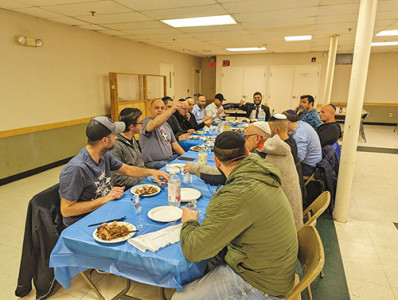
What began four months ago as a limited limud program in anticipation of the High Holidays has morphed into a non-traditional kollel that is steadily picking up steam. The founder and man behind the concept, Isaac Tzahi Cohen, has a unique background himself. An Israeli who served in the IDF, he grew in his religiosity after moving to Australia and eventually returned to Israel to learn in an evening kollel in Tel Aviv after work. While there, he learned from the leader of his kollel, Rabbi Zvi Knoll, that to market Judaism is not an option but an obligation. Soon after, he met his future American wife, Jordana, and moved to Fair Lawn in 2017.
The motivating factor that prompted him to start the learning program, explained Cohen, was he felt while Orthodox Jews of Fair Lawn born in the U.S. are, for the most part, settled and well served by the various shuls and numerous shiurim, those with a less traditional background and who often also face language barriers are in danger of falling through the cracks. Specifically, he felt the need was most pressing among the rather sizable population of Israelis living in town. He offered that there are 1,500 such families in Fair Lawn, rhetorically asking, “How many of them regularly attend shul?”
The original plan was to run the program Monday through Thursday evenings for the month of Elul. Through word of mouth, it got off to a strong start as attendees learned with their peers in a comfortable atmosphere. The Beit Midrash of Congregation Ahavat Achim on Saddle River Road was secured as the meeting place, with sessions taking place between 8:15-10 p.m..

Based on the positive start, Cohen decided to take it to the next step and turn the seasonal program into a regular kollel. He reached out to contacts in Monsey and Passaic to recruit more teachers. The response was positive. It was critically important to Cohen that the leaders speak the language of the attendees both figuratively and literally. In fact, the kollel is called Hamerkaz Shelanu, or “Our Central Place,” and is meant to be just that, a place where attendees can choose whatever subject matter or style which suits them and learn in English, Hebrew or Russian. The results speak for themselves as the program, which currently runs on Monday and Thursday evenings, regularly draws 15-25 participants a night.
Cohen tapped Russian native Rabbi Aryeh Grinberg as the rosh kollel, explaining, “He ticked off all the right boxes…Rabbi Grinberg truly serves Hashem with all his heart, isn’t materialistic, and has gained the respect of every segment of the Fair Lawn Jewish community.” Rabbi Grinberg, who learns with smaller groups on topics ranging from the Kuzari to Gemara, also delivers a short dvar Torah in English to the entire group before a 9:10 p.m. Maariv. He stressed that the goal of the kollel is to attract a full spectrum
of participants, which includes people of all ages, occupations (from limo drivers to scientists) and levels of Torah education. To him, the whole point of the program is to attract as wide a following as possible.
According to Cohen, the kollel has many facets and a specific logic behind it. They consist of lessons from the Rambam as well as Mishna in part one, followed by Maariv, with part two consisting of Halacha and the parsha. The evening includes shiurim as well as chavruta where participants choose whatever topics attract their interests. “The Torah speaks the language of humans” is the program’s guiding principle,” said Cohen, and “we place tremendous effort in securing educators who are a perfect match for the participants.”
Monday’s shiurim are taught in Hebrew by Rabbi Avrum Biton, a Sephardi originally from Israel. He explained that many Israelis in the Diaspora are looking for a connection, unlike those who continue to live in Israel, “where the land itself is the connection.”
The kollel will start a four-week program in Jewish philosophy beginning on Wednesday Feb. 1, led by professor Daniel Rynhold, dean of Revel Graduate School of Jewish Studies at Yeshiva University. It is meant to expand the kollel’s draw to traditional U.S.-born Jews.
In closing, Cohen again spoke of the void the kollel was filling by offering a place for those less settled to feel at home and grow in their Judaism. The program, with its wide range of learning choices, its camaraderie, and its sushi and pizza dinners, has something for everyone. The alternative was not an option. “If we don’t didn’t do anything,” he said, “the grandkids of many of our dear Jewish neighbors won’t be Jewish anymore.” Down the road, Cohen would love to see others take up the mantle in nearby Jewish communities within Bergen County by developing similar programs for Jews who may currently be invisible.
Robert Isler is a marketing research analyst and freelance writer. He can be reached at [email protected].










